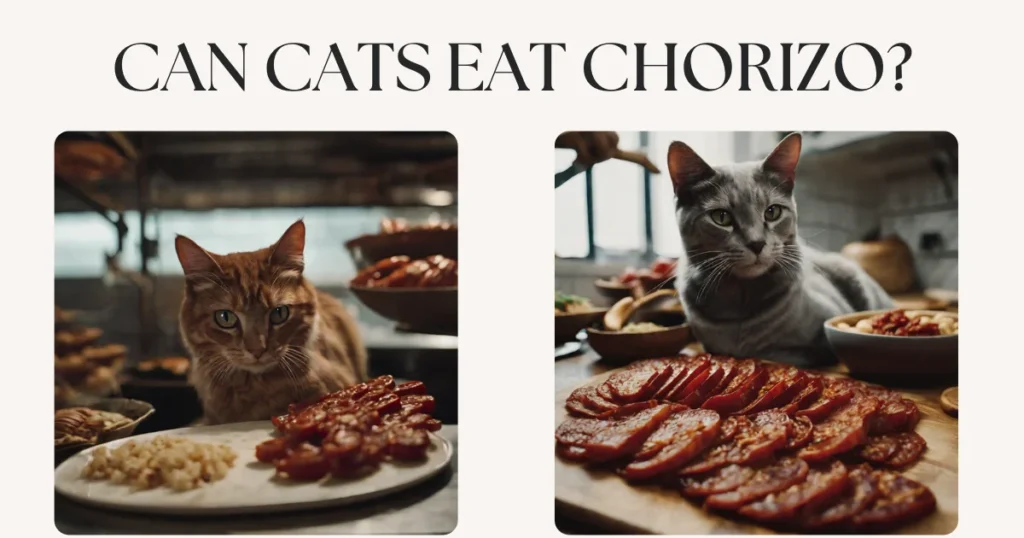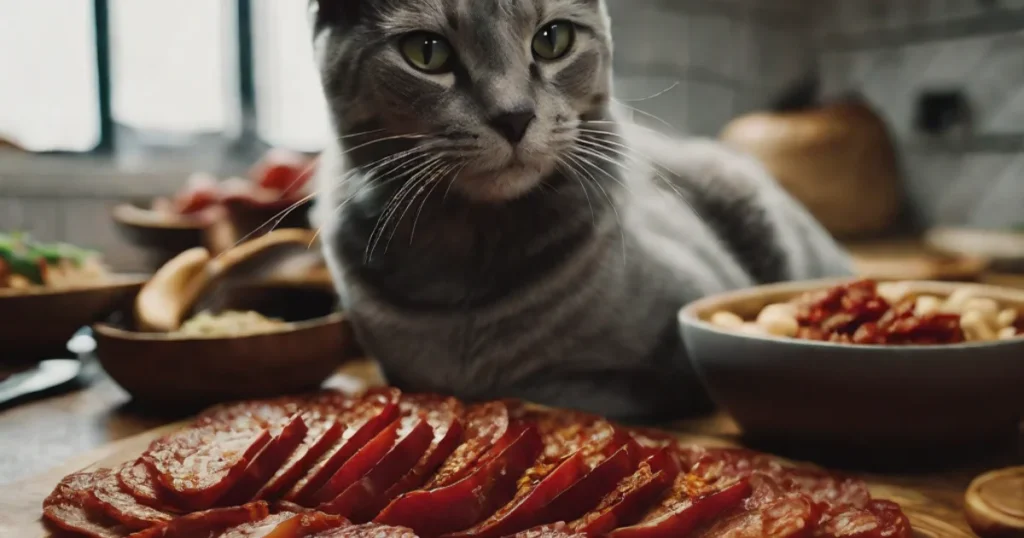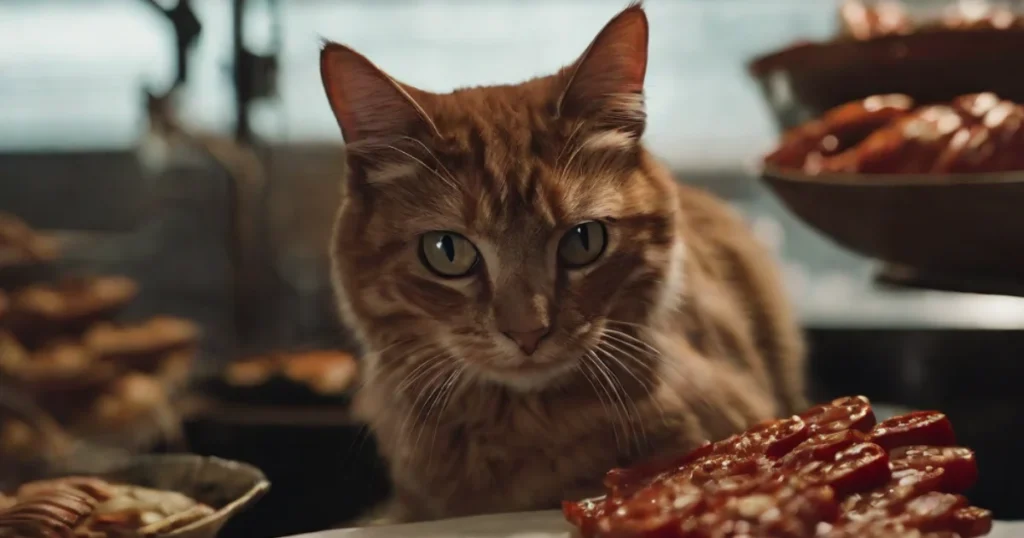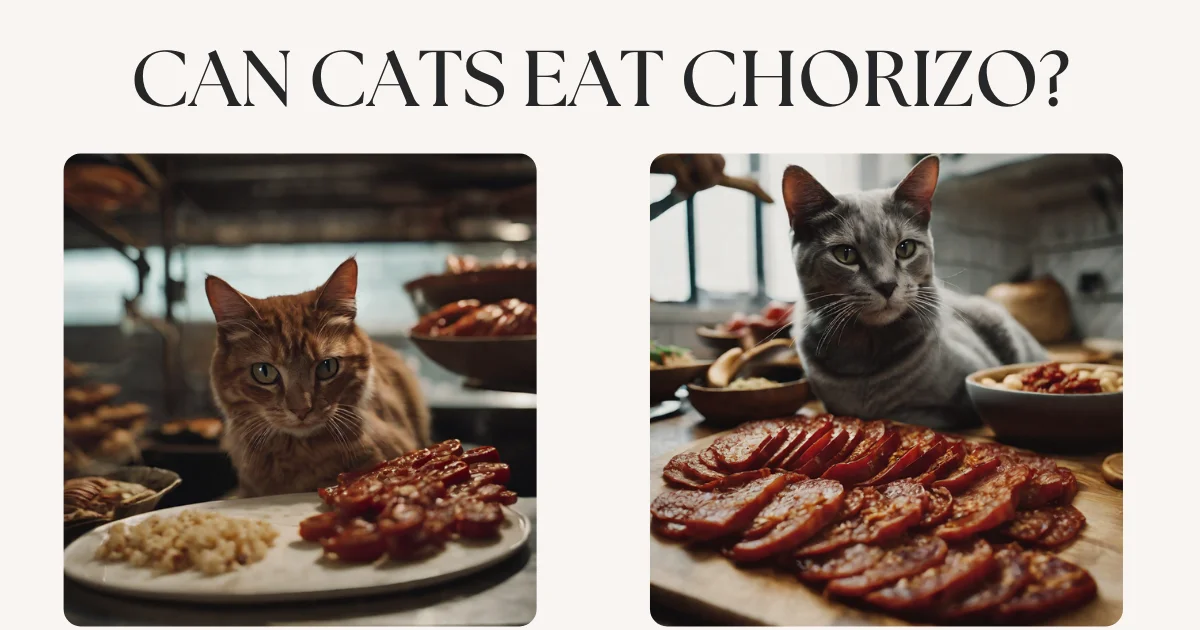Can cats eat chorizo? As a cat owner, I recently found myself asking this question after my cat ate chorizo that had fallen on the floor while cooking. While cats may be known for their curiosity and love of food, it’s important to be cautious about what they eat. After some research, I discovered that chorizo can be harmful to cats due to its spicy nature. In this blog post, we’ll explore the potential risks and dangers of feeding chorizo to cats, as well as what to do if your cat has already eaten some.

Can cats eat Chorizo?
No, cats should not eat Chorizo.
Table of Contents
Understanding Your Cat’s Digestive System
To properly understand the potential risks and dangers of feeding chorizo to cats, it’s important to have a basic understanding of their digestive system. Unlike humans, cats are obligate carnivores, which means they have specific dietary requirements that are different from ours.
Firstly, cats have a shorter digestive tract compared to humans. This means that their bodies are designed to process and absorb nutrients from meat-based diets efficiently. While they can tolerate small amounts of other foods, such as fruits and vegetables, their systems are not equipped to handle large quantities or foods that are too far outside their natural diet.
Secondly, cats lack the necessary enzymes to break down certain components found in plant-based foods, such as carbohydrates. This is why their diet should primarily consist of high-quality animal protein sources.
Additionally, cats have a higher requirement for specific nutrients, such as taurine, arachidonic acid, and vitamin A, which are found in animal tissues. These nutrients are crucial for their overall health and well-being.
When it comes to chorizo, a highly spiced and seasoned sausage, it’s important to note that it contains ingredients that may not be suitable for cats. Spices like chili powder and paprika, which are commonly found in chorizo, can be irritating to a cat’s digestive system and may lead to gastrointestinal upset.
Knowing all of this, it becomes evident that chorizo is not an ideal food for cats. While it may be tempting to share a tasty treat with our feline friends, it’s important to prioritize their health and well-being by providing them with a balanced and appropriate diet that meets their specific needs.
In the next section, we will dive deeper into the impact of spices on cats’ scent receptors and how they can affect their overall health. Stay tuned!

The Impact of Spices on Cats’ Scent Receptors
Can cats have chorizo? This question becomes even more important when we consider the impact of spices on their scent receptors. Cats have an incredible sense of smell, and their scent receptors play a crucial role in their overall well-being. When my cat ate chorizo, I couldn’t help but wonder how it would affect her sensitive nose.
Spices, such as chili powder and paprika, commonly found in chorizo, can be overwhelming for a cat’s delicate scent receptors. These receptors are responsible for detecting odors and helping cats navigate their surroundings. The strong spices in chorizo can potentially irritate and damage their sensitive noses.
In addition to the potential harm to their scent receptors, the spices in chorizo can also have adverse effects on a cat’s overall health. Spicy foods can cause gastrointestinal upset, leading to symptoms like vomiting, diarrhea, and stomach pain. This can be particularly problematic for cats with pre-existing digestive issues or sensitive stomachs.
As cat owners, it is our responsibility to prioritize our pets’ well-being. While the idea of sharing a tasty treat like chorizo with our feline friends may be tempting, it’s crucial to remember that their bodies are not designed to handle spicy foods as we do. Opting for cat-friendly treats and a balanced diet that meets their specific nutritional needs is always the safest choice.
In the next section, we will explore the potential effects of cooked chorizo on cats, diving deeper into the risks and dangers it poses to their digestive systems. Stay tuned for more information on keeping our furry friends happy and healthy!
Exploring the Effects of Cooked Chorizo on Cats
Can cats have chorizo? It’s a question that many cat owners may find themselves asking after an incident like mine, where my cat ate chorizo that had fallen on the floor while cooking. As mentioned earlier, chorizo is a highly spiced and seasoned sausage, and it contains ingredients that may not be suitable for cats. But what exactly are the effects of cooked chorizo on cats?
When it comes to cooked chorizo, the effects on cats can be quite detrimental. The spices and seasonings found in chorizo can cause a range of issues for our feline friends. Firstly, strong spices like chili powder and paprika can irritate a cat’s delicate digestive system, leading to gastrointestinal upset. This can manifest in symptoms such as vomiting, diarrhea, and stomach pain. It’s not a pleasant experience for our furry friends, and it can be particularly problematic for cats with pre-existing digestive issues or sensitive stomachs.
In addition to digestive issues, the spices in chorizo can also hurt a cat’s overall health. As mentioned earlier, cats have highly sensitive scent receptors, and the strong spices in chorizo can potentially irritate and damage these receptors. This can not only affect their sense of smell, but it can also impact their overall well-being.
Considering the potential risks and dangers of feeding cooked chorizo to cats, it’s clear that it’s best to avoid giving it to them altogether. While it may be tempting to share a tasty treat with our feline friends, their bodies are not designed to handle spicy foods like we do. Opting for cat-friendly treats and a balanced diet that meets their specific nutritional needs is always the safest choice.
In the next sections, we will explore the symptoms of irritation in cats due to spicy food, what to do if your cat eats spicy food, alternative safe foods for cats, and the risks of feeding your cat spicy human food. Stay tuned for more information on how to keep our furry friends happy and healthy!

Symptoms of Irritation in Cats Due to Spicy Food
If your curious feline friend has managed to sneak a taste of spicy food like chorizo, it’s important to be aware of the potential symptoms of irritation that may arise. While cats may be drawn to the aroma and flavors of spicy food, their bodies are not equipped to handle it like humans do. Here are some signs that your cat may be experiencing irritation due to consuming spicy food like chorizo:
1. Gastrointestinal Upset: Cats who have ingested spicy food may experience vomiting, diarrhea, or stomach pain. Keep an eye out for any changes in their litter box habits or signs of discomfort after they’ve eaten chorizo or other spicy foods.
2. Excessive Salivation: Spicy food can lead to excessive drooling in cats. If you notice your cat drooling more than usual after consuming chorizo, it could be a sign of irritation.
3. Lethargy: Cats who are feeling unwell may exhibit lethargy or a lack of energy. If your usually active and playful cat seems unusually tired or inactive after eating spicy food, it may be a sign of discomfort.
4. Pawing at the Mouth: Irritation from spicy food can cause cats to paw at their mouths or face. If you observe your cat exhibiting this behavior after eating chorizo, it’s a good indication that they may be experiencing discomfort.
5. Decreased Appetite: Cats who are not feeling well may lose their appetite or show a decreased interest in food. If your cat is avoiding their regular meals after consuming spicy food, it could be a sign of irritation or digestive upset.
It’s important to note that these symptoms can vary in severity depending on the individual cat and the amount of spicy food consumed. If you notice any of these signs, it’s best to consult your veterinarian for guidance and to ensure your cat’s health and well-being.
In the next section, we will discuss what to do if your cat has consumed spicy food and how to provide relief for their discomfort. Stay tuned for helpful tips on keeping your feline friend happy and healthy.
What To Do If Your Cat Eats Spicy Food
If your curious feline friend has managed to sneak a taste of spicy food like chorizo, it’s important to take action to ensure their well-being. Here are some steps you can take if your cat eats spicy food:
1. Monitor their behavior: Keep a close eye on your cat for any signs of discomfort or illness. Look out for symptoms such as vomiting, diarrhea, excessive drooling, lethargy, pawing at the mouth, or a decreased appetite. If you notice any of these signs, it’s crucial to take appropriate measures to address the situation.
2. Provide plenty of fresh water: Spicy foods can cause dehydration in cats, so make sure your furry friend has access to fresh water at all times. Hydration is key to flushing out any potential irritants and maintaining their overall health.
3. Offer bland and soothing foods: If your cat is experiencing digestive upset from spicy food, it’s a good idea to offer them bland and soothing foods. Opt for options like boiled chicken or plain rice, which are easy on their stomach and can help alleviate any discomfort.
4. Consult your veterinarian: If your cat’s symptoms persist or worsen, it’s essential to seek professional veterinary advice. Your veterinarian will be able to provide guidance specific to your cat’s needs and recommend appropriate treatments if necessary.
Remember, prevention is always better than cure. While it may be tempting to share spicy treats with your feline friend, it’s best to prioritize their health and well-being by providing them with a balanced and appropriate diet. By keeping spicy foods like chorizo out of reach and offering cat-friendly alternatives, you can help ensure your cat stays happy and healthy.
Alternative Safe Foods for Cats
When it comes to finding alternative safe foods for cats, it’s important to consider their unique dietary needs. While cats are obligate carnivores and require animal protein for optimal health, there are still a variety of safe and healthy options that can satisfy their taste buds. Here are a few alternative safe foods that you can offer to your feline friend instead of chorizo:
1. Cooked chicken: Plain, boneless, and skinless chicken is a great option for cats. It provides high-quality protein and can be easily digested. Just make sure it’s thoroughly cooked and doesn’t contain any seasoning or spices.
2. Fish: Cats are known for their love of fish, and it can be a healthy addition to their diet. Opt for cooked fish like salmon or tuna, but avoid any seasonings or added ingredients. Also, make sure the fish is boneless to prevent any choking hazards.
3. Plain canned pumpkin: Plain canned pumpkin can be a safe and healthy treat for cats. It’s high in fiber and can help with digestion. However, be sure to choose plain pumpkins without any added sugars or spices.
4. Plain yogurt: Plain yogurt, specifically ones that contain live active cultures, can be beneficial for cats. It can promote healthy digestion and provide probiotics. Just make sure it’s free of any artificial sweeteners or added sugars.
Remember, these alternative safe foods should only be offered as occasional treats or additions to your cat’s balanced diet. It’s always best to consult with your veterinarian before introducing any new foods to your cat’s diet, especially if they have any specific dietary requirements or health issues. By offering these alternative safe foods, you can keep your cat satisfied and healthy while avoiding the potential risks of feeding them spicy human food like chorizo.
The Risks of Feeding Your Cat Spicy Human Food
Feeding your cat spicy human food, like chorizo, can pose several risks and potential health problems for your feline friend. While it may be tempting to share a spicy treat with your cat, it’s important to remember that their digestive systems and taste preferences differ from ours.
One of the main risks of feeding cats spicy human food is the potential for gastrointestinal upset. Spicy foods can cause digestive issues in cats, leading to symptoms such as vomiting, diarrhea, and stomach pain. Cats are not equipped to handle the spices found in human foods like chorizo, as their bodies are designed to process and absorb nutrients from meat-based diets efficiently. Additionally, the strong spices found in chorizo, such as chili powder and paprika, can be irritating to a cat’s digestive system and may lead to gastrointestinal distress.
Another risk of feeding your cat spicy human food is the potential damage it can cause to their sensitive scent receptors. Cats have an incredibly keen sense of smell, and their scent receptors play a crucial role in their overall well-being. The spices in chorizo, like chili powder and paprika, can be overwhelming for their delicate noses and potentially irritate and damage their scent receptors. This can not only affect their sense of smell but also impact their overall health and well-being.
In addition to the immediate risks, feeding your cat spicy human food can also create long-term health issues. Spicy foods can lead to inflammation and irritation in the digestive tract, potentially causing chronic gastrointestinal problems for your cat. Additionally, certain spices, such as garlic and onion, which are often found in spicy human foods, can be toxic to cats and cause anemia or damage to their red blood cells.
To ensure the health and well-being of your cat, it’s best to avoid feeding them spicy human food like chorizo. Instead, focus on providing them with a balanced and appropriate diet that meets their specific nutritional needs. If you want to treat your cat, opt for cat-friendly treats or safe foods that are known to be beneficial for felines, such as cooked chicken or fish.
Remember, when it comes to feeding your cat, it’s always better to be safe than sorry. By avoiding spicy human food and prioritizing their health, you can keep your feline friend happy and healthy for years to come.
Cats and Spicy Food: What You Need to Know
When it comes to spicy food and cats, it’s important to know the facts and take necessary precautions to keep your furry friend safe. So, what do you need to know about cats and spicy food like chorizo?
First and foremost, cats should not have chorizo or any spicy human food. As obligate carnivores, their digestive systems are not equipped to handle spicy ingredients like chili powder and paprika. These spices can cause irritation and inflammation in their sensitive digestive tracts, leading to symptoms like vomiting, diarrhea, and stomach pain. Additionally, the strong spices found in chorizo can be overwhelming for a cat’s delicate scent receptors, potentially causing damage and affecting their overall well-being.
While cats may be curious and tempted by the aroma of spicy food, it’s crucial to prioritize their health and well-being. Instead of sharing spicy treats with your feline friend, opt for cat-friendly alternatives like plain, boneless, and skinless cooked chicken or fish. These options provide the necessary animal protein without the risk of spices or seasonings that can harm your cat.
Remember, prevention is always better than cure. By keeping spicy human food out of reach and offering appropriate alternatives, you can ensure that your cat stays happy and healthy. So, resist the urge to share your chorizo with your cat and stick to a diet that meets their specific nutritional needs. Your furry friend will thank you!
Preventing Spice-Related Health Problems in Cats
Now that we know the potential risks and dangers of feeding chorizo to cats, it’s crucial to take preventive measures to ensure your furry friend stays safe and healthy. Here are some tips for preventing spice-related health problems in cats:
1. Keep spicy foods out of reach: The best way to prevent your cat from consuming spicy foods like chorizo is to ensure they cannot access them. Keep all spicy human foods securely stored in cabinets or high shelves where your cat cannot reach them. Be mindful when cooking and avoid leaving any food unattended on countertops or tables.
2. Offer cat-friendly alternatives: Instead of giving your cat spicy treats, opt for cat-friendly alternatives that are safe and healthy for them. As mentioned earlier, cooked chicken or fish without seasoning or spices can be a great option. These alternatives provide the necessary animal protein without the risk of spices or seasonings that can harm your cat.
3. Educate others in the household: If you live with other family members or roommates, make sure they understand the importance of not feeding your cat spicy foods. Ensure that everyone is aware of the potential risks and the specific dietary needs of cats. Encourage them to follow the same guidelines and to only offer safe foods to your furry friend.
4. Consult with your veterinarian: If you have any concerns about your cat’s diet or if they have consumed spicy food, it’s always best to consult with your veterinarian. They can provide you with specific advice and recommendations based on your cat’s individual needs and health conditions.
By taking these preventive measures, you can help keep your cat safe from spice-related health problems. Remember, the well-being of your furry friend should always be the top priority. So, let’s keep those spicy treats for ourselves and provide our cats with a diet that meets their specific nutritional needs.
Conclusion
In conclusion, cats should not have chorizo or any other spicy human food. While it may be tempting to share a tasty treat with our feline friends, their bodies are simply not equipped to handle the spices and seasonings found in these foods. Chorizo, with its chili powder and paprika, can cause irritation and damage to a cat’s sensitive digestive system and scent receptors.
To keep our cats safe and healthy, it is important to prioritize their specific dietary needs. Cats are obligate carnivores, meaning they require high-quality animal protein for optimal health. Instead of feeding them spicy human food, opt for alternative safe foods like cooked chicken or fish. These options provide the necessary nutrients without the potential risks and dangers of spices.
Prevention is key when it comes to spice-related health problems in cats. Keep spicy foods out of reach, educate others in the household about the risks, and consult with your veterinarian if you have any concerns. By following these guidelines and providing a balanced and appropriate diet, you can ensure that your furry friend stays happy and healthy.
Remember, your cat’s well-being should always be the top priority. So, resist the urge to share your chorizo and other spicy treats with your feline companion, and instead focus on giving them the love, care, and appropriate foods they need to thrive.
FAQs
Q: Can cats eat chorizo sausage?
A: It is not recommended to feed cats chorizo sausage. Chorizo typically contains spices, seasonings, and high levels of fat, which can be harmful to cats. Spicy foods and excessive fat can cause digestive upset and potentially lead to more serious health issues in cats. It’s best to stick to a balanced, cat-specific diet.
Q: Can cats eat chorizo and eggs?
A: Chorizo and eggs are not suitable for cats. Chorizo contains spices and seasonings that can be harmful to cats, while eggs should be cooked thoroughly to avoid the risk of salmonella. It’s important to provide cats with a nutritionally balanced diet that is specifically formulated for their needs.
Q: My cat ate chorizo. What should I do?
A: If your cat has consumed chorizo, monitor them closely for any signs of digestive upset or discomfort. Contact your veterinarian for guidance, as they can provide specific advice based on your cat’s health and the amount of chorizo ingested.
Q: What can cats eat?
A: Cats have specific dietary requirements and should primarily consume balanced and nutritionally complete cat food. This typically includes high-quality cat food that is appropriate for their life stage. Some safe and healthy treats for cats can include cooked plain meats like chicken or fish, as well as certain fruits and vegetables in moderation. It’s always best to consult with a veterinarian for specific dietary recommendations.
Q: Can cats eat chocolate?
A: No, cats should not eat chocolate. Chocolate contains theobromine, which is toxic to cats. Even small amounts of chocolate can cause symptoms such as vomiting, diarrhea, rapid breathing, abnormal heart rhythm, and potentially more severe complications. It is important to keep chocolate away from cats.
Q: Can cats eat cheese?
A: While some cats may enjoy the taste of cheese, it is not recommended to feed them cheese regularly or in large amounts. Most cats are lactose intolerant, and cheese can cause digestive upset such as diarrhea. If you want to give your cat a small amount of cheese as a treat, monitor their reaction and make sure they tolerate it well.
Q: Can cats eat eggs?
A: Cats can eat cooked eggs in moderation. Eggs are a good source of protein for cats. However, they should be cooked thoroughly to avoid the risk of bacterial contamination. It’s best to serve eggs plain, without any seasoning or additives.
Q: Can cats eat ham?
A: While small amounts of plain, cooked ham may not be toxic to cats, it is not a recommended food for them. Ham is high in sodium and fat, which can be harmful to cats in large quantities. Additionally, processed meats like ham often contain seasonings and additives that can be detrimental to a cat’s health. It’s best to stick to a balanced cat-specific diet.

